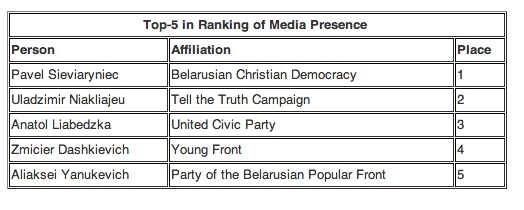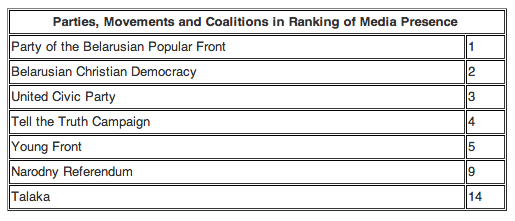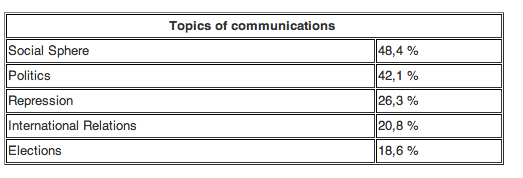Sieviaryniec and Generational Shift in Belarusian Opposition

On 14 April, the Belarusian Institute for Strategic Studies published a new issue of its Political Mediabarometer. Pavel Sieviaryniec, co-chairman of the Belarusian Christian Democrats, is now the new leader in terms of media presence in Belarus.
Sieviaryniec' success demonstrates emergence of a new generation of Belarusian opposition. Zmicier Dashkevich of the Young Front and Aliaksei Yanukevich of the Party of the Belarusian Popular Front also faired well in the study.
Preparations for local elections attracted little attention in the media, while the number of references to the opposition discussing bread and butter issues decreased from 10% to 8%.
The opposition remains reactionary, not proactive, with their messages to the public. Mainly they spread information related to releasing political prisoners, celebrating the 25th anniversary of the Belarusian Popular Front or their own organisation congresses. Despite this trend, the volume of proactive communication that opposition politicians themselves have initiated has increased.
New Media Leader
BISS`s research shows that Paviel Sieviarynec has become the most prominent member of the opposition in the Belarusian media. His release and rapid ascent into the political arena has, in large part, contributed to this phenomenon.
Uladzimir Niakliajeu slipped to second in the rankings, although he remains the most popular opposition politician in Belarus. According to the Independent Institute of Socio-Economic and Political Studies (IISEPS) his rating is holding steady at 7.1%. Niakliajeu, Alexander Milinkevich and their deputies will primarily decide who will challenge Lukashenka in the coming presidential elections in 2015.

During the period studied, Anatol Liabiedzka from the United Civic Party published a book. The 25th anniversary of the Belarusian Popular Front helped Aliaksei Yanukevich, the party`s leader, to stick around the top of the rankings. Zmicier Dashkevich, leader of the Young Front, took fourth place largely thanks to his organisation's active congress.
The number of references of females politicians declined from 16% to 9%. Maryna Adamovich, wife of Mikalai Statkevich, remains popular in the media, but this is largely due to the fact that acts a conduit who transmits news about her husband (who remains in prison). The number of references to Anastasia Dashkevich after her husband's release has declined, although she remains a prominent member of the Tell the Truth campaign.

The ratings for political organisations in the media is very similar to the ranking of individual politicians. For the first ranking, the study assessed the media presence of coalitions. According to their research, Narodny Referendum (People's Referendum) had much better results than Talaka.
This ishappened because of the growth of its offline activity, proactive communication and the variety of politicians that represent the coalition. The focus of each coalition differs. Narodny referendum focuses on bread and butter issues and Talaka on the demand to hold free elections.
The Opposition's Issues
Over the period of this study, reachers noticed a rapid growth in the number of Belarusian opposition references in the media – from 3,217 in July-September 2013 to 5,998 during October-December. While these references do not indicate that the opposition is gaining ground politically, it does appear to indicate that the opposition is intensifying its efforts.
However, this activity rarely deals with the lives of ordinary people. The 11% growth in the sheer number of mentions of ordinary opposition organisations members is evidence that there is an awakening occurring amongst democratic forces.
BISS analysts have defined the four catalysts of political communication during this period as: the release of Sieviaryniec, the 25th anniversary of the Belarusian Popular Front, the anniversary of the 2010 presidential elections and the events in Ukraine.
59% of the references found were from online resources, with 31% of those references having retained party information within their content. The significance of Facebook has also grown, according to the study, although the study did not cover vk.com – a Russian-language social network and perhaps the most popular social network and overall web site in Belarus.
Preparations for local elections was all but invisible in the media. Objectively, the opposition did little in the way of making this issue front page news. Public issues like prison releases, deaths or religious holidays were the most popular topics of the opposition.

The topic of repression will likely remain at the top of these rankings as long as they exist. International relations' relevance spiked upwards due to the events in Ukraine. The economy has slid to eighth place, though this might be in part due to the fact that the opposition raises these issues primarily as coalitions.
Despite the stereotypes, the opposition's media presence in almost half of the cases analysed were associated with more practical work. The study's authors wrote that public events, policy implementation or meetings with foreign politicians were the opposition's principal activity.
BISS also divides up the types of references into different categories. One third of the references discovered were related to a more general pool of information, while in 31.7% of the references discovered, Belarusian politicians were mentioned as participants in an event – this is in reference primarily to Yury Hubarevich and Aliaksei Yanukievich, who visited Maidan in Kyiv.
Opposition Awakening Before the Presidential Elections?
Reports such as these would seem to suggest that the opposition has awakened after a period of slumber. While their actions do not usually go beyond the "opposition ghetto", as people say in Belarus, the growth in the number of references and the appearance of a new popular leader in the media appear to indicate a period of intense political activity.
Seviarynec will continue to occupy to the upper end in the rankings. He will likely try to play the role of an opposition coalition builder as well as a coordinator of the process for selecting candidates for the presidential elections. Seviarynec himself cannot stand as a candidate due to his recent imprisonment and his party has no viable alternative.
His colleague from the Belarusian Christian Democrats, Vital Rymasheuski, lacks credibility in the eyes of other opposition politicians which means that Seviarynec's party does not have a contender in the upcoming elections.
A growing number of young politicians are coming into their own. Unlike their older colleagues, individuals like Sieviaryniec, Dashkievich, Hubarevich, Dzmitryjeu, Lahviniec, Yanukevich rose to prominence 10 or even 15 years ago, after Lukashenka came to power. A generational overturn is gradually unfolding in Belarus.





